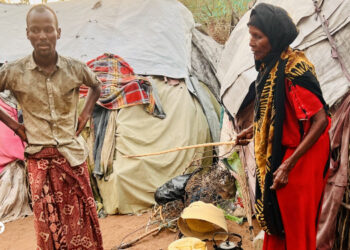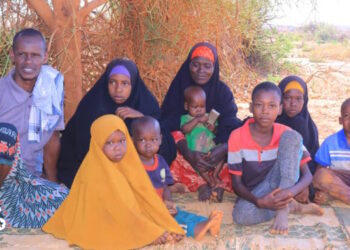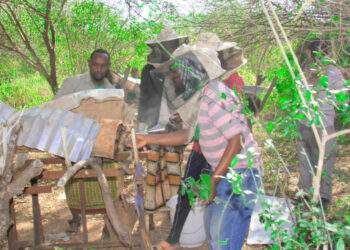We are re-issuing this report after being corrected and updated. We regret that the first version published stated that Norwegian Refugee Council (NRC) built the houses in 2022, with UNHCR funding. Later it was found that some information provided had been incorrect. The houses were built by Danish Refugee Council (DRC) in 2021 with UNHCR funding. We apologise for the error and for any confusion caused.
(ERGO) – Houses built by aid groups to permanently settle displaced people in an area outside Galkayo, central Somalia, are being sold by desperately indebted families who are unable to make a living in the housing settlement.
Samatar Abdi Jama, 61, recently sold his two-room house in Wadajir to pay off debts that had left his family facing a food crisis.
He sold the house – built by the aid group Danish Refugee Council (DRC) with funding from the UN’s refugee agency UNHCR in 2021 – for $2,500. He said he used $2,000 to pay off debts and $500 for his family’s basic living expenses over three months.
Without work, he had been taking credit from local shopkeepers who finally said they wouldn’t give any more loans until he paid off what he owed.
“When the food shops denied us credit because we already owed them, what could we do? Could we stay in a place where we had no livelihood and the children were going hungry?” Samatar said.
He moved his family back into an internal displacement camp near the city of Galkayo, as Wadajir some distance away offered few to no opportunities.
“These are the problems I moved away to escape from. I had nothing there [in Wadajir]. Here, I can go to the city and get something that God provides for me. At least my children can get one meal a day.”
Although he has not been able to find proper work in Najah IDP camp where they now live, as he is too old to get consistent work in construction, his wife is making about two dollars a day doing laundry jobs.
He and his family of 11 children are now living in an open-sided shack that offers no protection from the cold or heat.
The downgrade to such appalling and precarious living conditions is depressing and not what he wished for, but he says he didn’t have any option.
“It’s such a difference – when I had the house, I was not in such trouble and hardship as I am now. The house was mine; it was a good shelter. My children had one room and I had another. Now we are in trouble – a thief could come in…a snake could bite you. It’s scary. This is not even our land. They can tell us to leave at any time and go somewhere else,” he said.
Another home owner in Wadajir, Ahmed Salad Yasin, sold his house for $2,800 to pay off a $2,500 debt.
He had been jailed for a month for failing to pay the debt. He has since returned to live in Bulo-doro IDP camp with his family of 10.
Ahmed said he was forced to take desperate measures when his daily wage as a stone quarry worker dropped from $8 to $4. That amount only covered the bus fare to and from work.
He told Radio Ergo that he struggled with the decision, but had to sell the house to pay off his debt fearing another jail sentence.
“The main reason for selling my house was the large debt I had accumulated. When the people I owed got tired of waiting, they took me to the police station. I was jailed. I was given a month to
pay, and when the month came and I couldn’t pay, I was forced to sell my house. I sold it for a cheap price. I sold it for $2,800, and the debt I had was $2,500,” Ahmed said.
The remaining $300 helped his family get by for two months, but since then they have had to rely on whatever help they can get from other families in the camp.
“We are living in a very difficult situation that no human can endure. When I was in my house, it was still a struggle. But now, in addition to the struggle, I am without a home. I was struggling before, but I was inside a house. I am now in a worse situation than I was before. I don’t know what to do…I don’t know where to get help or who to appeal to,” he said.
Similarly, the family of Hassan Ali Hussein, consisting of 11 people, have returned to Najah IDP camp after selling their home for $2,100 to pay off a debt of $1,800.
Life in the camp is terrible, but he had no option.
“I sold my house because of my circumstances. Now I am back in a bad situation – I have nothing. It’s the same situation. There is no difference, because I am in debt on all four sides, and my children are in the house with no food. It’s one problem layered on top of another,” Hassan said.
He usually took a monthly supply of food on credit worth about $100 from a local shop. This debt accumulated to $1,800, after his casual labour job with engineers ended at the beginning of last year.
The families Radio Ergo spoke to indicated that without a stable income, they were unable to manage debts and basic expenses, forcing them to sell their houses in Wadajir.
Community sources said more than 40 displaced families so far had sold the houses they were given by aid groups and many of them had returned to live in IDP camps.
The buyers of these houses are local residents, who have the means and interest to acquire permanent housing. The sale prices are between $2,000 and $3,000.










